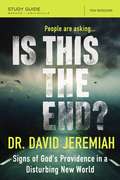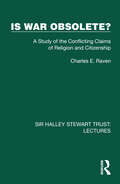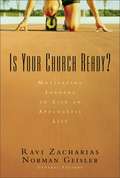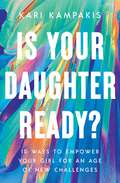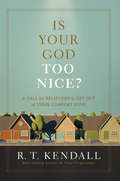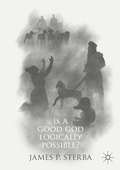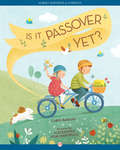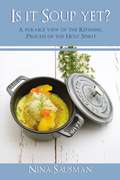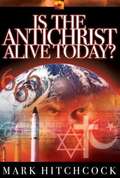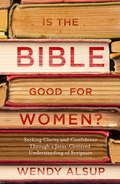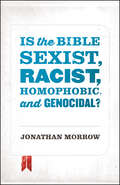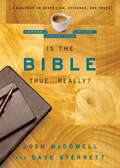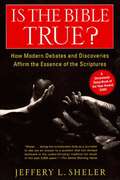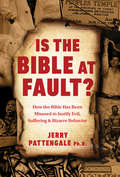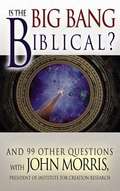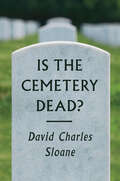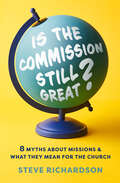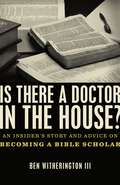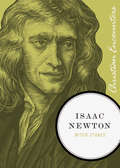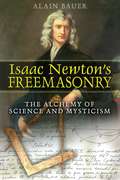- Table View
- List View
Is This the End? Study Guide: Signs of God's Providence in a Disturbing New World
by David JeremiahWe have almost become immune to the reality of today's headlines: from terrorism to natural disasters to political upheavals to refugees to disease to nuclear threats to failing economies...and the list goes on. People are thinking and asking, "Is this the end?" Nobody can answer that question specifically. In fact, Jesus warned about setting dates for the end of the age. But this we can say: Never have so many world-level events developed so rapidly and with such catastrophic implications. These events bring to mind the apostle Paul's words about "birth pangs" before the end of the age. In Is This the End? Study Guide, Pastor David Jeremiah looks at ten major developments in America and the world that almost defy imagination. Just a few years ago, nobody could have imagined the things we hear about daily in the news. We need to understand these events: what they are, what the Bible says about them, and how we should respond as followers of Christ. Follow Dr. Jeremiah as he unfolds five developments in America and five developments on the international stage-all of which beg the question, "Is this the end?"
Is War Obsolete?: A Study of the Conflicting Claims of Religion and Citizenship (Sir Halley Stewart Trust: Lectures)
by Charles E. RavenOriginally published in 1935, this volume Is War Obsolete? A Study of the Conflicting Claims of Religion and Citizenship is based on the Halley Stewart Lectures presented in 1934 and examines the responsibility of Christians for peace. It aims to reconsider the basis of Christian Pacifism and to appeal to those in the Churches to make up their minds on the issue and to act upon their decisions. The approach is that of the individual rather than the community, and of religion and ethics more than politics or philosophy.This book is a re-issue originally published in 1935. The language used and views portrayed are a reflection of its era and no offence is meant by the Publishers to any reader by this re-publication.
Is Your Church Ready?: Motivating Leaders to Live an Apologetic Life
by Ravi Zacharias Norman L. GeislerA ministry resource for motivating all Christians to become thoughtful apologists of their faith Although apologetics is as crucial today as it has ever been, the classical model for defending the faith often seems irrelevant to the 21st century where people listen with their eyes and think with their emotions. Is Your Church Ready? Presents a team of highly qualified Christian thinkers—including Ravi Zacharias, John Guest, Jay Budziszewski, Judy Salisbury, Dean Halverson, and Peter Grant—who build a case for the place of apologetics in the local church, home, and school. Using personal examples and illustrations they address: • How to answer objections to Christianity • How to equip children in the home and prepare youth to remain committed to Christ after they leave for college • How to reach international students and the foreign-born Included are discussion questions and a “Church Leaders Resource Guide” to the best books, articles, organizations, and websites on the subject.
Is Your Daughter Ready?: 10 Ways to Empower Your Girl for an Age of New Challenges
by Kari KampakisToday's girls need grace and grit. How do we raise them in light, yet prepare them for the dark? The journey of a girl mom often presents tricky terrain. In the early years, moms focus on the good. Being kind. Noticing beauty. Having faith and hope for the future. All the while, wondering: Can we help them believe in goodness yet not be naïve? Can we prepare them to handle hard realities without letting reality harden them? Bestselling author Kari Kampakis champions you in this paradoxical journey. Like a big sister who's seen the wilderness and come back to report what's ahead, Kari offers a realistic yet optimistic framework. Is Your Daughter Ready? is your anthem for raising a powerful force for good in a world that's deeply hurting. With Kari as your guide, learn how to intentionally pack the essentials your daughter will need for her life journey by: instilling the love and light of Christ in her heart to empower her to be a light in the world; modeling healthy relationships to set her up for success in personal, professional, and romantic connections; providing her with the tools needed to have tough conversations with confidence and grace; cultivating a mission mentality so she can look beyond her circumstances to see God's purpose; and creating an environment of trust in God, assuring her that He will conquer any darkness. Reclaim the joy of motherhood and the power of your home as you lovingly pour into your daughter, teach her to stand on her own two feet, and pray for the day when she outruns you and begins to empower her own generation.
Is Your God Too Nice?: A Call for Believers to Get Out of Their Comfort Zone
by R. T. KendallDo you worship the God of the Bible, or a fictional character? This book will bring us back to the God of the Bible. Not the God we like or the way we wish He were, but the very God of the Bible—unembellished, unvarnished—as He really is. This does not mean we will like Him. Many times we are embarrassed by the God of the Bible, especially the God of the Old Testament. We are even embarrassed by the teachings of Jesus when it comes to His being the only way to be saved, as well as God&’s right to judge and reward or condemn. We attempt to manage God&’s PR and fix His image in the modern world. We are tempted to modify and mold God into what we want Him to be—what we think He should be. Instead we should be finding out where God is and meet Him there, even if that takes us out of our comfort zones. This book will challenge you to give up your conception of what you would like God to be and come to know Him as He really is.Other Books by R.T. Kendall:Word and Spirit (2019) ISBN-13:978-1629996493Total Forgiveness (2010) ISBN-13: 978-1599791760Whatever Happened to the Gospel? (2018) ISBN-13: 978-1629994710Popular in Heaven Famous in Hell (2018) ISBN-13: 978-1629995519The Presence of God (2017) ISBN-13: 978-1629991573Holy Fire (2014)ISBN-13: 978-1621366041
Is a Good God Logically Possible?
by James P. SterbaUsing yet untapped resources from moral and political philosophy, this book seeks to answer the question of whether an all good God who is presumed to be all powerful is logically compatible with the degree and amount of moral and natural evil that exists in our world. It is widely held by theists and atheists alike that it may be logically impossible for an all good, all powerful God to create a world with moral agents like ourselves that does not also have at least some moral evil in it. James P. Sterba focuses on the further question of whether God is logically compatible with the degree and amount of moral and natural evil that exists in our world. The negative answer he provides marks a new stage in the age-old debate about God's existence.
Is it Passover Yet?
by Alessandra Psacharopulo Chris BarashIt's time to clean the house, set out our best dishes, and fill our homes with food and family to celebrate the joyous holiday of Passover! In this sweet story, join one family as they gather with loved ones to share the joy of togetherness and freedom that Passover brings. This is a fixed-format ebook, which preserves the design and layout of the original print book.
Is it Soup yet?: A Parable View of the Refining Process of the Holy Spirit
by Nina SausmanFollowing my Grandmother&’s old recipe for homemade Chicken soup one day, I began to see similarities in each step to those of the refining process the Holy Spirit was doing in my own life. We, as Christians have been predestined to be transformed into the image of Jesus Christ. It&’s a daily work of the Holy Spirit in us that brings it about. The process of dying to self and opening the way for Jesus to live life through us.I have written this book for the Body of Christ, both those who are new in their faith walk and mature Christians, to encourage, teach and challenge them to open themselves up to the amazing work the Holy Spirit desires to do in our lives.I have held this revelation in my heart for many years now. But as I look at our world and see the faces of so many who are desperately searching for something to fill the emptiness and loneliness in their hearts, I realize we have what they need in us, Jesus Christ. I believe that in such a time as this, it&’s time for the Church, us, to show Jesus to the world as never before.I have lived, and experienced the events of each page and hope and pray that as you read and study it, you will learn to look at your life&’s experiences no longer as just coincidence and evil circumstances of this world but as Spiritual events in the Transformation process.
Is the Antichrist Alive Today?
by Mark HitchcockFind out what Mark Hitchcock means when he says there is an Antichrist alive today, right now, in this generation! Easy to read and biblically solid, Hitchcock's fascinating resource illuminates what the Bible says about the Antichrist and explains how the prophecies about him strikingly foreshadow today's events: 1) the rise of the European Union; 2) the peace process in Israel; 3) the rush toward globalization; 4) the technology and desire for a worldwide identification system; 5) the movement to rebuild the temple in Jerusalem
Is the Bible Good for Women?: Seeking Clarity and Confidence Through a Jesus-Centered Understanding of Scripture
by Wendy AlsupIs it possible to embrace the inherent dignity of womanhood while still cherishing the Bible?Many people, both inside and outside the church, are concerned that an orthodox understanding of the Bible is threatening and even harmful to women. After all, the Bible has a number of passages regarding women that are deeply troubling and hard to read. But is that assessment accurate? In this fascinating look at God’s work of redemption from Creation to today, Wendy Alsup explores questions such as: * How does God view justice and equal rights for women?* What does it mean to be made in the image of God?* How have the centuries distorted our interpretation of how God views women?* How did Jesus approach the Old Testament and how does that help us read difficult passages today?* What is the difference between a modern view of feminism and the feminism that Scripture models?* How does the Bible explain the Bible to us?Using a Jesus-centered understanding to look at both God’s grand storyline and specific biblical passages, Alsup gives practical and accessible tools for understanding the noble ways God speaks to and about women in its pages and the dignity He places on His daughters.
Is the Bible Really the Word of God?
by Watch Tower Bible Tract SocietyExamining who wrote the Bible.
Is the Bible Sexist, Racist, Homophobic, and Genocidal?
by Jonathan MorrowFrom the complete book:Can a thoughtful person today seriously believe that God wrote a book? There are an unprecedented number of sophisticated attacks on the origin, credibility, and reliability of the Bible. It can be difficult to know what to say when skepticism and secularism take over so many conversations.Additionally, confusion and doubt about the Bible being God's Word are becoming as common inside the church as they are in the broader culture. The purpose of this book is to respond to these challenges, sound bites, and slogans...and give people confidence that the Bible can be trusted and that it matters for our lives because God really has spoken.
Is the Bible Sexist, Racist, Homophobic, and Genocidal?
by Jonathan MorrowFrom the complete book:Can a thoughtful person today seriously believe that God wrote a book? There are an unprecedented number of sophisticated attacks on the origin, credibility, and reliability of the Bible. It can be difficult to know what to say when skepticism and secularism take over so many conversations.Additionally, confusion and doubt about the Bible being God's Word are becoming as common inside the church as they are in the broader culture. The purpose of this book is to respond to these challenges, sound bites, and slogans...and give people confidence that the Bible can be trusted and that it matters for our lives because God really has spoken.
Is the Bible Sexist: Beyond Feminism and Patriarchalism
by Donald G. BloeschThe author writes: "In this book I speak as a man who is for woman. I regret that I have not always been as active as I should have been in defending the legitimate rights of women and in decrying sexism, the sin of treating women as inferiors. In this, I share in the guilt of most men today. Yet I must raise my voice in protest against certain excesses in modern feminism which I regard as undermining women as well as the moral fabric of our society. As I see it, both patriarchalism and feminism result in the oppression and isolation of woman. In traditional patriarchal culture, it was the wife's business to make her husband successful, not the husband's business to make his wife happy. Subordination has generally meant in these circles abject submission to the dictates of the will of the man. The woman may be permitted to be a teacher of other women, but never of men. In modern feminist ideology, it is the wife's prerogative to fulfill herself, even at the expense of her obligations to her husband and family. Whether married or unmarried, the woman is encouraged to pursue a goal in which she realizes autonomy or independence. Both feminism and patriarchalism accentuate loneliness in the existence of woman, and the alternative that I propose is designed to overcome this."
Is the Bible True . . . Really?: A Dialogue on Skepticism, Evidence, and Truth (The Coffee House Chronicles)
by Dave Sterrett Josh McDowellWith over 40 million books sold, bestselling author Josh McDowell is no stranger to creatively presenting biblical truth. Now, partnering with fellow apologist Dave Sterrett, Josh introduces a new series targeted at the intersection of story and truth.The Coffee House Chronicles are short, easily devoured novellas aimed at answering prevalent spiritual questions. Each book in the series tackles a long-contested question of the faith, and then answer these questions with truth through relationships and dialogue in each story.In Is the Bible True, Really?: A Dialogue on Skepticism, Evidence, and Truth, we meet Nick, a college freshman at a state school in Texas. Nick has his spiritual world turned upside-down with what he hears in an introduction to religion class. His questions turn into conversations as he dialogues with professors, friends, and family about the authenticity and authority of the Bible.The other two books in the series: Who is Jesus, Really? and Did the Resurrection Happen, Really? continue the unfolding story at the college campus and the coffee house down the road.
Is the Bible True . . . Really?: A Dialogue on Skepticism, Evidence, and Truth (The Coffee House Chronicles)
by Dave Sterrett Josh McDowellWith over 40 million books sold, bestselling author Josh McDowell is no stranger to creatively presenting biblical truth. Now, partnering with fellow apologist Dave Sterrett, Josh introduces a new series targeted at the intersection of story and truth.The Coffee House Chronicles are short, easily devoured novellas aimed at answering prevalent spiritual questions. Each book in the series tackles a long-contested question of the faith, and then answer these questions with truth through relationships and dialogue in each story.In Is the Bible True, Really?: A Dialogue on Skepticism, Evidence, and Truth, we meet Nick, a college freshman at a state school in Texas. Nick has his spiritual world turned upside-down with what he hears in an introduction to religion class. His questions turn into conversations as he dialogues with professors, friends, and family about the authenticity and authority of the Bible.The other two books in the series: Who is Jesus, Really? and Did the Resurrection Happen, Really? continue the unfolding story at the college campus and the coffee house down the road.
Is the Bible True?: How Modern Debates and Discoveries Affirm the Essence of the Scriptures
by Jeffery L. ShelerA Christianity Today Book of the Year: “An excellent book for anyone interested in the Bible both as a work of history and a testament of faith.” —Publishers WeeklyIn this authoritative, bold, and balanced book, renowned U.S. News & World Report religion writer Jeffrey L. Sheler sifts through the claims and counterclaims of contemporary biblical studies. After carefully investigating the full spectrum of cutting-edge research and conflicting reports, he challenges the popular perception that the credibility of the Bible has been seriously undermined by critical scholarship. Rather, he concludes that the weight of the historical evidence upholds the essential truth of Exodus, the Gospel accounts of Jesus, and other vital elements of the Bible. The author draws extensively from his own interviews with leading Bible experts and on-site reports from Israel and Egypt in his examination of scholarship’s hot-button issues, including: *Dramatic archaeological discoveries that both affirm and challenge the history in the Bible *The controversial quest for the historical Jesus and its sometimes-flawed arguments and skeptical assumptions regarding the reliability of the Gospels*The amazing revelations of the Dead Sea Scrolls and other ancient texts that profoundly influence our understanding of the Bible*The mysterious phenomenon of the Bible Code and why there may be far less to its doomsday prophecies than meets the eyeWritten in clear, compelling prose, Is the Bible True? presents a sophisticated analysis informed by important scholarly work in lucid, accessible terms.
Is the Bible at Fault?: How the Bible Has Been Misused to Justify Evil, Suffering and Bizarre Behavior
by Jerry Pattengale Daniel Freemyer Nicholas DeNeffThis provocative new book provides the truth and perspective needed to remind us of how high the stakes can be when we get the Bible wrong. Throughout history and around the world, people have made bizarre or dangerous claims in the name of God. They continue to do so today, citing biblical passages out of context or inappropriately. Doing so has led to a wide range of disasters, from executing other Christians for theological differences, to wild activities in the name of evangelism, and more. Is the Bible at Fault? examines these historical errors, problematic biblical interpretations, and tragedies to reveal how and why the Bible has been misused to justify and rationalize profound acts of persecution, destruction, violence, human rights abuse, and downright strange behavior.Is the Bible at Fault? explores twelve different cases of abhorrent behavior in the name of Scripture. These terrible, destructive movements have led people astray, brought irreparable spiritual and emotional harm, and even cost countless people their lives. The members of the Ku Klux Klan had no doubt that their actions were justified in the eyes of God. The murderous armies of the Fourth Crusade rationalized slaying other Christians in the name of the church. Detroit’s Prophet Jones locked his followers in all-night revival meetings and often wouldn’t let them out until they made financial contributions to the cause—the cause being his lavish lifestyle. Some Christian missionaries not only condoned the wholesale slaughter of Australia’s native Aborigines people, they participated in it—with a clean conscience. These are real, historical people and events, and we’ll explore every one of them and more in these pages.
Is the Big Bang Biblical?
by Dr John D. MorrisAlmost everyone has an interest in science. Whether we're simply star-gazing, or conducting laboratory experiments, studying the world around us offers marvelous opportunities to learn. As the natural world unfolds around us, it also prompts philosophical questions: Where did it all come from? Did someone make all this? Geologist and author John Morris, President of the Institute for Creation Research, if often asked a host of questions about how our world came to be. In this book, he answers a hundred of the most common questions, and the variety of topics will excite readers of all ages. In his clear, non-technical style, Morris tackles the following: Has evidence for Noah's flood been found in the Black Sea? Can science prove the Bible? Doesn't carbon dating prove the earth is old? If all animals were created as plant eaters, why do some have sharp teeth? Is there water on the moon? What about stem cell research? And many more!
Is the Cemetery Dead?
by David Charles SloaneIn modern society, we have professionalized our care for the dying and deceased in hospitals and hospices, churches and funeral homes, cemeteries and mausoleums to aid dazed and disoriented mourners. But these formal institutions can be alienating and cold, leaving people craving a more humane mourning and burial process. The burial treatment itself has come to be seen as wasteful and harmful—marked by chemicals, plush caskets, and manicured greens. Today’s bereaved are therefore increasingly turning away from the old ways of death and searching for a more personalized, environmentally responsible, and ethical means of grief. Is the Cemetery Dead? gets to the heart of the tragedy of death, chronicling how Americans are inventing new or adapting old traditions, burial places, and memorials. In illustrative prose, David Charles Sloane shows how people are taking control of their grief by bringing their relatives home to die, interring them in natural burial grounds, mourning them online, or memorializing them streetside with a shrine, ghost bike, or RIP mural. Today’s mourners are increasingly breaking free of conventions to better embrace the person they want to remember. As Sloane shows, these changes threaten the future of the cemetery, causing cemeteries to seek to become more responsive institutions. A trained historian, Sloane is also descendent from multiple generations of cemetery managers and he grew up in Syracuse’s Oakwood Cemetery. Enriched by these experiences, as well as his personal struggles with overwhelming grief, Sloane presents a remarkable and accessible tour of our new American way of death.
Is the Commission Still Great?: 8 Myths about Missions and What They Mean for the Church
by Steve RichardsonDismantling the Myths that Obscure God&’s Great Plan The primary mission of the church is to glorify God by blessing all peoples of the world through the gospel of Jesus Christ. The Great Commission&’s task of global disciple-making is the most ambitious project ever undertaken. Given the scale and complexity of global missions, it&’s no wonder that misconceptions abound, even among invested, godly people.Questions and skepticism about missions arise from both outside and inside the church. Is missions an outdated idea? Do missionaries do more harm than good? Are we succeeding or failing? Is it time for global believers to do the job in their own countries with minimal Western involvement? We don&’t need to fear questions like these. But we do need to seek—and find—solid, biblical answers.Is the Commission Still Great? dismantles the myths that obscure God&’s beautiful plan to make disciples of all nations. Misperceptions discourage God&’s people from joyfully participating with Him in reaching the world. Yet, deepening our understanding of the call to missions restores perspective and motivates us to participate in God&’s grand design.Author and missionary kid Steve Richardson uses stories from Scripture, history, and his own ministry experience to impart timely lessons on modern missions. Richardson also draws from the wisdom of field missionaries, sending agencies, pastors, and church members to address this all-important endeavor. Each chapter finishes with thought-provoking questions to facilitate purposeful discussion in families and small groups. Is the Commission Still Great? will equip followers of Christ to be participants—not spectators—in the redemption of the world.
Is the Commission Still Great?: 8 Myths about Missions and What They Mean for the Church
by Steve RichardsonDismantling the Myths that Obscure God&’s Great Plan The primary mission of the church is to glorify God by blessing all peoples of the world through the gospel of Jesus Christ. The Great Commission&’s task of global disciple-making is the most ambitious project ever undertaken. Given the scale and complexity of global missions, it&’s no wonder that misconceptions abound, even among invested, godly people.Questions and skepticism about missions arise from both outside and inside the church. Is missions an outdated idea? Do missionaries do more harm than good? Are we succeeding or failing? Is it time for global believers to do the job in their own countries with minimal Western involvement? We don&’t need to fear questions like these. But we do need to seek—and find—solid, biblical answers.Is the Commission Still Great? dismantles the myths that obscure God&’s beautiful plan to make disciples of all nations. Misperceptions discourage God&’s people from joyfully participating with Him in reaching the world. Yet, deepening our understanding of the call to missions restores perspective and motivates us to participate in God&’s grand design.Author and missionary kid Steve Richardson uses stories from Scripture, history, and his own ministry experience to impart timely lessons on modern missions. Richardson also draws from the wisdom of field missionaries, sending agencies, pastors, and church members to address this all-important endeavor. Each chapter finishes with thought-provoking questions to facilitate purposeful discussion in families and small groups. Is the Commission Still Great? will equip followers of Christ to be participants—not spectators—in the redemption of the world.
Is there a Doctor in the House?: An Insider’s Story and Advice on becoming a Bible Scholar
by Ben Witherington IiiMany people assume that becoming a serious student of the Bible merely requires diligent study of English Bible translations, but biblical scholarship is much more complex. Is There a Doctor in the House? demonstrates what it takes to be a responsible Bible teacher, a well-published Bible scholar, or even a good student of the Bible: exacting knowledge of biblical languages and the languages in which most Bible scholarship is done; a love for history and archaeology; a sensitivity for literature and literary genres; and an understanding of theology, ethics, and ancient religions and philosophies. In one sense, every Bible scholar has to be a general practitioner—the foundation of biblical scholarship must be both broad and well built. Through the course of this book, Witherington invites would-be Bible experts to pursue excellence for the sake of the Bible’s world-altering message. From students considering a Ph.D. to lay Bible teachers, Is There a Doctor in the House? promises to be an informative, engaging, and often humorous resource.
Isaac Newton (Christian Encounters Series)
by Mitch StokesChristian Encounters, a series of biographies from Thomas Nelson Publishers, highlights important lives from all ages and areas of the Church. Some are familiar faces. Others are unexpected guests. But all, through their relationships, struggles, prayers, and desires, uniquely illuminate our shared experience.As an inventor, astronomer, physicist, and philosopher, Isaac Newton forever changed the way we see and understand the world. At one point, he was the world's leading authority in mathematics, optics, and alchemy. And surprisingly he wrote more about faith and religion than on all of these subjects combined. But his single-minded focus on knowledge and discovery was a great detriment to his health. Newton suffered from fits of mania, insomnia, depression, a nervous breakdown, and even mercury poisoning. Yet from all of his suffering came great gain. Newton saw the scientific world not as a way to refute theology, but as a way to explain it. He believed that all of creation was mandated and set in motion by God and that it was simply waiting to be "discovered" by man. Because of his diligence in both scientific and biblical study, Newton had a tremendous impact on religious thought that is still evident today.
Isaac Newton's Freemasonry: The Alchemy of Science and Mysticism
by Alain BauerAn exploration of how modern Freemasonry enabled Isaac Newton and his like-minded contemporaries to flourish • Shows that Freemasonry, as a mystical order, was conceived as something new--an amalgam of alchemy and science that had little to do with operative Freemasonry • Reveals how Newton and his friends crafted this “speculative,” symbolic Freemasonry as a model for the future of England • Connects Rosslyn Chapel, Henry Sinclair, and the Invisible College to Newton and his role in 17th-century Freemasonry Freemasonry, as a fraternal order of scientists and philosophers, emerged in the 17th century and represented something new--an amalgam of alchemy and science that allowed the creative genius of Isaac Newton and his contemporaries to flourish. In Isaac Newton’s Freemasonry, Alain Bauer presents the swirl of historical, sociological, and religious influences that sparked the spiritual ferment and transformation of that time. His research shows that Freemasonry represented a crossroads between science and spirituality and became the vehicle for promoting spiritual and intellectual egalitarianism. Isaac Newton was seminal in the “invention” of this new form of Freemasonry, which allowed Newton and other like-minded associates to free themselves of the church’s monopoly on the intellectual milieu of the time. This form of Freemasonry created an ideological blueprint that sought to move England beyond the civil wars generated by its religious conflicts to a society with scientific progress as its foundation and standard. The “science” of these men was rooted in the Hermetic tradition and included alchemy and even elements of magic. Yet, in contrast to the endless reinterpretations of church doctrine that fueled the conflicts ravaging England, this new society of Accepted Freemasons provided an intellectual haven and creative crucible for scientific and political progress. This book reveals the connections of Rosslyn Chapel, Henry Sinclair, and the Invisible College to Newton’s role in 17th-century Freemasonry and opens unexplored trails into the history of Freemasonry in Europe.
